-
Vaccine Season by Hannu Rajaniemi
It is evident that this story is written during and inspired by the COVID19-pandemic, but it is not about a new pandemic. Rather the existence of vaccines that can cure basically everything, is used as a vehicle for a thoughtful story that is both small and large in scope.
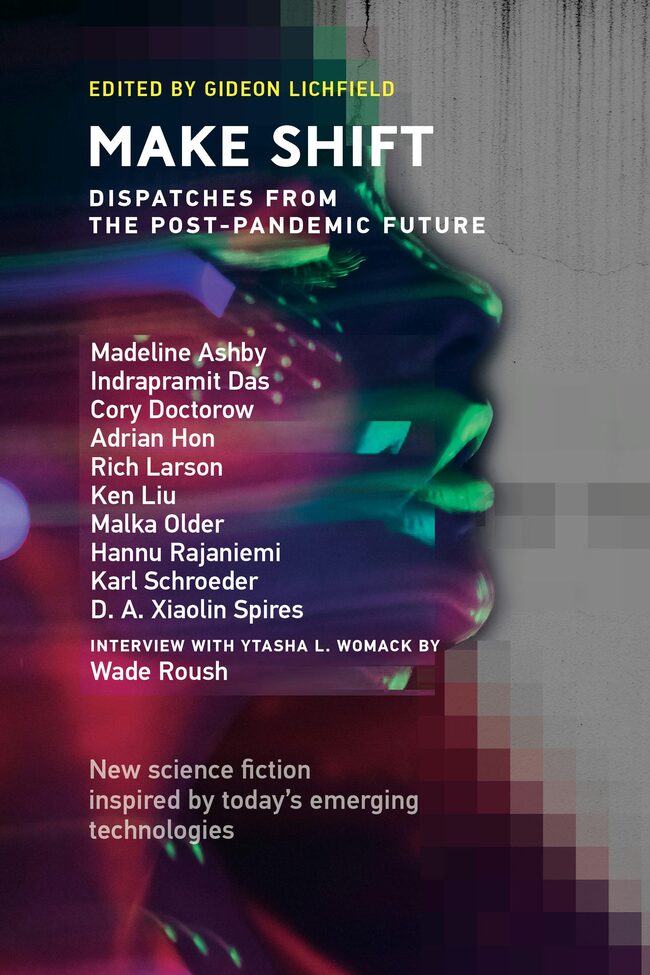
I would guess the setting to be about 40 years in the future, where very effective vaccines are released every year. Thus forming the term “vaccine season”. However, these vaccines works like viruses themselves in that they can spread through the population without direct injection. This is generally presented as a positive thing, though it does acknowledge that there is some ethical complicated questions of consent.
All this is background information, as the actual story is simply a boy visiting his grandfather and he really wants his grandfather to get the latest vaccine that would make one practically immortal. The grandfather having lived through some tough years in his life is not interested, even though he acknowledges and respects his grandson for his utopian views of the future.
What makes this story interesting is the thoughts on ethics it provokes. I am not entirely sure what the authors intention is with how this little family drama ends, and I don’t think I agree with what happens, but it was none the less an interesting sombre little short story. Easy to relate to the grandfather as he is probably from my generation in this future, and it allows for some reflection on how to tackle future prospects and the challenges that might lay ahead.
Read in The Best Science Fiction of the Year - Volume 7, edited by Neil Clarke
Originally published in Make Shift: Dispatches from the Post-Pandemic Future, edited by Gideon Lichfield
Rating: 4 -
Uncle Roy's Computer Repairs and Used Robot Parts by Martin L. Shoemaker
This novella is a light and cozy story about an experienced computer guy, Roy, who settles down in smaller town, hoping to just do some small time computer repair stuff for the local community. However, this town already has a local computer expert that everyone trusts, so Roy has a fierce rival from day one.
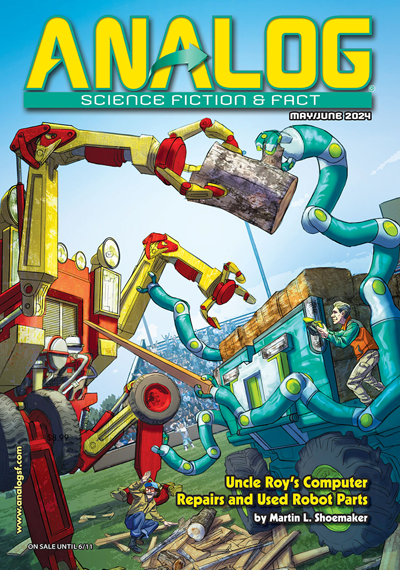
We follow Roy as he gets acquainted with the community and how everything IT related is apparently run by one self-taught yet brilliant boy named Jimmy. Roy learns that Jimmy fights him because he wants to protect his peers and not have their jobs replaced by technology. But their feud becomes worse and with the introduction of robots, their fight could start to hurt real people and not just computer systems.
The story is easily readable and flows nicely, though a bit long perhaps. The science fiction element is very slight with some robot technology that could only be few years in the future. I like how the general vibe of the story is filled with good intent despite the feud and it has a bit of a Simak feeling to it.
Read in Analog May/June 2024
Rating: 3 -
The Rattler by Leonid Kaganov
This translated story from Russian (translation by Alex Shvartsman) is an unique and gripping story. The afterword tells of a slightly hidden message in support for Ukraine, which underlines the story’s theme of fighting against oppression.
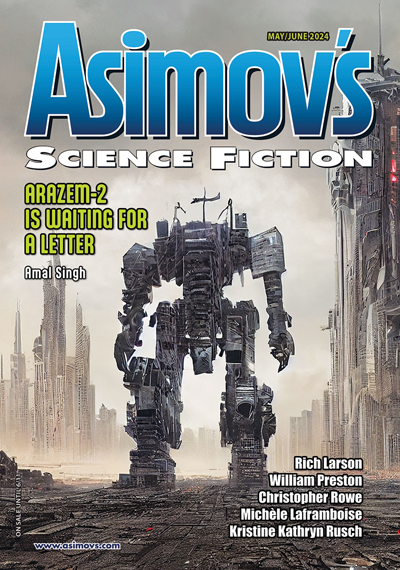
A powerful alien entity is killing one random person every second. All attempts to overpower it has failed with the people behind it being killed, showing that the entity will deter from its randomness if it needs to. This has led to a defeatist complacency where people just try to not be noticed and hope for the best. Even at a rate of one human every second, there is still “only” a 0.3% risk of getting killed in a given year and it will take more than 200 years for it to wipe out every human on the planet. However, someone is working on an interesting theory on what is actually going on and how to stop it.
Despite the story being mostly people discussing their theories and planning, with only a small amount of “action”, I found this story to be quite effective and the less-than-subtle commentary on how joined forces can overcome a powerful enemy works to the benefit of the story.
Read in Asimov’s May/June 2024
Rating: 4 -
Susan Rose Sees Mars as the First Frontier by Charles Velasquez-Witosky
Stories about artists in a science fiction setting is a topic I find interesting, but it is somewhat rare, as many science fiction writers are engineering or science focused. “Zima Blue” by Alastair Reynolds and “The Hydrogen Sonata” by Iain M. Banks are worthy mentions. This short story about the first painter on Mars is a good read too.

The story follows Susan Rose, an established painter that gets the chance to be the first painter on Mars. She struggles and experiment with painting in free fall and lower gravity, with her style adapting along the way. She paints hundreds or thousands of pictures of various landscapes on Mars, while pondering the philosophical ramifications of being the first to interpret another world compared to thousands of years of humans doing the same on Earth.
There isn’t much of a story here, but it makes up for it with well written poetic musings of artistic work that makes for pleasant reflective reading.
Read in Analog May/June 2024
Rating: 4 -
Last Thursday by Kristine Kathryn Rusch
Would time travelers go back to the year 2020 in the middle of the pandemic? It doesn’t seem like the ideal time to travel to if one had the choice, but that is the premise of this little poignant story.

Rupert is a time travel agent of some sort and goes back to 2020 Las Vegas on a research mission. He walks around and observe the people behind their masks while being bored that nothing really happens. He comes across a sign on a bar that says there is a time travelers meeting last Thursday in the bar. So he starts jumping backwards a week at a time hoping to find the meeting.
This story doesn’t involve the usual time travel side effects or paradoxes. It is a pretty mellow and casually philosophical piece on the nature of fate and obviously a reflection of the Covid lockdown. It is a good story, but I think it would have had a bigger impact if it was published when the pandemic was at its highest.
Read in Asimov’s May/June 2024
Rating: 3 -
Une Time Machine, S’il Vous Plait by Peter Wood
I guess most people who have any interest in time travel have thought about what they would do if they were thrown back in time with the knowledge they had. In this quirky and fun time travel story, four people are by accident transported back to 1970s and they deal with that opportunity in different ways.
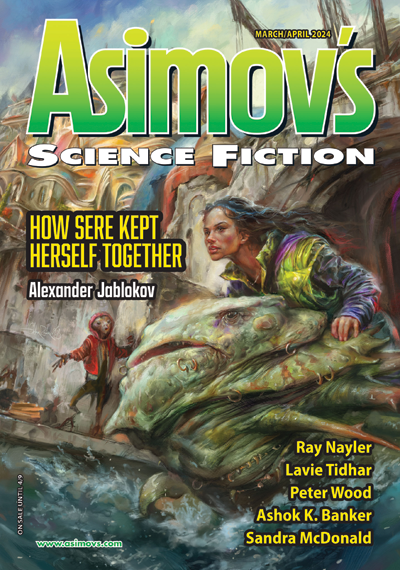
The focus is mostly on Ruth who with some knowledge of a prominent Hockey game is able to gamble herself to a lot of money and she uses the capital to gain influence over the Star Trek like tv series she was involved in at the time. Roles and themes gets a major change, which doesn’t please the star of the show - Wallace, who also has been transported to the past.
The story is a mix of fun clichés and satire on gender roles and science fiction tv shows. Great entertainment with well rounded characters.
Read in Asimov’s March/April 2024
Rating: 3+ -
Undertow by Gregor Hartmann
The concept of removing the need for sleep in humans is likely most well known from the novella “Beggars in Spain” by Nancy Kress. Here we follow someone who volunteers for a military testing program that is trying to achieve that with some experimental drug.

The story is told from the point of view of a young American who volunteered mostly to get out of being drafted to fight forest fires. The others are mostly Mexicans who basically need the money. They all sign a contract prohibiting them from quitting the experiment and they live locked up in a facility as they get the experimental treatment. Our protagonist gets increasingly worried as others start to get life-threateningly ill from the drugs.
The narrative is straight forward and doesn’t have a big dramatic payoff, but the quality lies with its well written characters and the background world building.
Read in Analog March/April 2024
Rating: 3 -
Why Don't We Just Kill the Kid In the Omelas Hole by Isabel J. Kim
This response to the classic story by Ursula LeGuin has gotten a bit of a buzz around the internet with discussions on Metafilter and Hacker News, as well as the Clarkesworld Discord server.
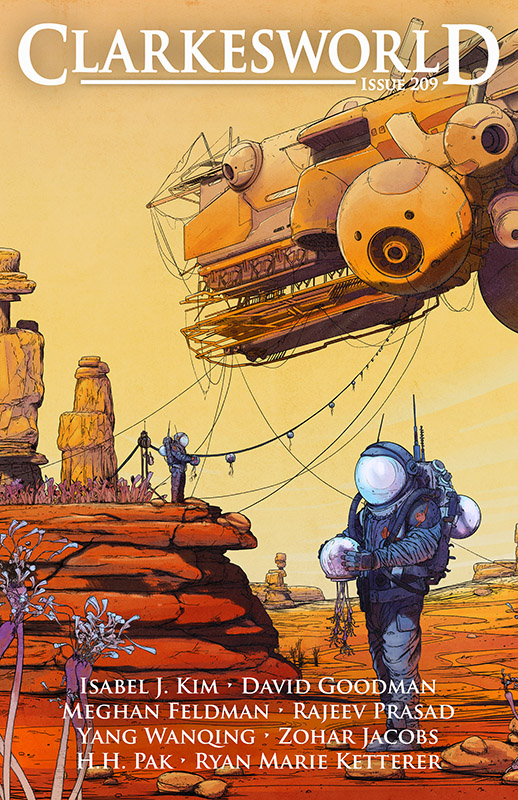
Like the original story the philosophical nature of this sparks discussion and thoughts with plenty of ways to interpret it. This story even outright state the different metaphors for the kid in the hole. I follow probably the most obvious take on it, as seeing it as a reflection on the rich western countries being dependent on exploiting third world countries.
This story is a bit more blunt in what it wants the reader to think about, and it becomes rather self referential and meta with characters in the story having the same sort of reflections on what is going on and what the kid in the hole means. The story reads as it was a historic article on the events, which works well enough, but lacks a bit of a personal anchor for the read to engage with.
Read in Clarkesworld February 2024
Rating: 3+ -
Death and the Gorgon by Greg Egan
While Greg Egan excels in his hard science fiction with very mathy stories, with this well paced murder mystery thriller, he shows he is more than capable of writing good entertaining stories.
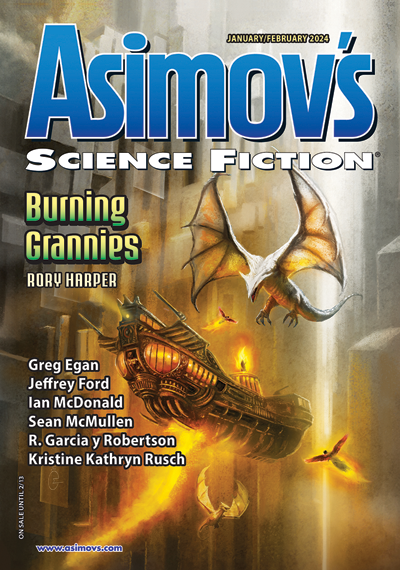
In the near future companies are selling the promise of life after death by putting peoples brains in a freezer in the hope that they can be brought back to life in some utopian future. This has led to a cult following on this idea with desperately wanting a chance for a life in that dream future. When a structural collapse in a facility storing these brains destroys - and really kills - more than a hundred of these frozen brains, investigator Beth is tasked with figuring out whether it was just an accident or if it was sabotage.
While the core of the story is an exciting and perfectly well structured investigative mystery, what I found to be the standout here is the depiction of the culture that surrounds this idea of freezing your brain with the hope of waking up in an utopian future. It is clear that Egan is silently mocking the Sillicon Valley futurists type people that are boasting ideas in this sort of direction today. With how we can just reach utopia through technology and enough time. Highly recommended.
Read in Asimov’s January/February 2024
Rating: 4+ -
A Flaw in the Works Julie Nováková
I always enjoy a good first contact story and this one by Julie Nováková, a relatively new name in the short fiction field I need to keep an eye on, adds something new and refreshing to something familiar in that genre.
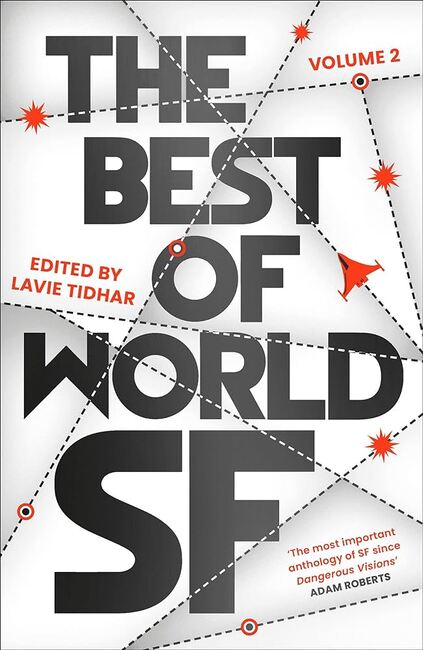
In the outer edges of our solar system, Lena and Tomas are observing a planet and they have made contact with an alien race. They are working on establishing a line of communication and figuring out how much information on Earth they want to give these aliens, even though they seem friendly. It is not a story with much action, but instead we get plenty of thoughts and interesting dialogue from Lena and Tomas about their mission, themselves and Earth’s history. During which we slowly as a reader learn more about this future the story is set it. It leads up to something that I wouldn’t quite call a big twist, merely an interesting reveal on the nature of things.
Everything is just masterly well written and a joy to read a story that doesn’t rely on action or conflict to provide a thoughtful and inspiring story.
Read in Forever Magazine, December 2023
Originally published in The Best of World SF: Volume 2
Rating: 4+